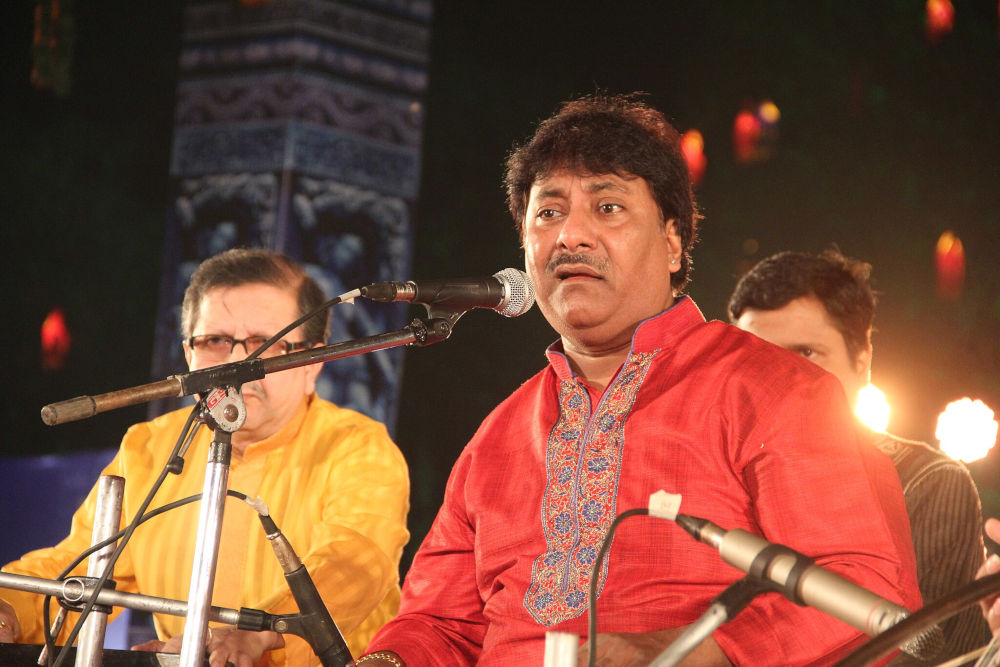[By Krupasindhu Muduli, CC BY-SA 4.0, via Wikimedia Commons]
A deeper piece on a maestro's craft. You can read part 1 here.
Burnt fingers
The first time I heard Rashid Khan, I burnt my fingers. It was the end of a May nor’wester, thunder and lightning was giving way to gentle rain and the maestro was warming up to his signature bandish in Desh raga, Karam kar dije and my newly acquired music system was starting to throb with his dulcet baritone voice. I listened, spellbound to a voice as pure as the rain, until the cigarette unmindfully dangling from my fingers gently seared my fingertips, breaking his spell and bringing me rudely back to real life.
Years later, smoking and other youthful vestiges far behind me—in fact last year—I wandered alone around the Burj Khalifa musical fountains in Dubai, at once alienated by the gathering swarms of people, and entranced by the visual feast on offer. Organically, wistfully, unmindfully, I reached out once again to the recording offered below. Khan sahab’s voice soared up and down, round and about, as if in keeping with the musical fountains. Karam kar dije.
It was a truth universally acknowledged in singing days of yore that a good voice was ideal but not necessary for a career in Hindustani classical music. Apologies to the reader, I suppose in the days of Auto-Tune this is increasingly true. Reversing back on that thought, in days of yore, aspiring pandits and ustads would travel the length and breadth of forest-laden golden quadrilateral-bereft Hindusthan in search of much needed voice training. One such voyage proved so fruitful for “Ghagge” Khuda Baksh, the founder of the twentieth century now for all purposes extinct Agra gharana, that he was forbidden to sing at shaadis for good.
Circling back to the sam (the first matra (beat) of any tal), after this historical departure, what made the voice of the dearly lamented Rashid Khan so special? It was at once deep, sonorous, rich and flexible, adaptable as easily to the gravitas of Malkauns as it was to the playfulness of Desh. Like Bhimsen Joshi, who continued to sing during Rashid’s times, therefore, the pianissimo-fortissimo effect of his voice was without peer. Over time, his tendency to set off his rocket-propelled taan, was tempered by a notable thehran. Now, assured of the power of his voice, the ustad could create such slow burn performances of Todi and Darbari, mesmerising the audience with a skilfully knit web of notes.
In effect, Rashid’s voice remains the gateway drug for initiates of Hindustani Classical Music, the stuff you can burn your fingers with. Like the 78 RPM records of Bade Ghulam Ali Khan, and, even earlier, Abdul Karim Khan, his voice casts a spell on listeners that helps to ease in some of the harder, if not equally sonorous stuff—Malikarjun Mansur, Onkarnath and eventually, Krishnarao Shankar Pandit and the Dagar brothers. This recording from fairly early on in his career is indicative of the power of his music, without any concessions whatsoever in terms of classicism and musical purity.
Hard masters
When James Garner’s Colonel Trautman makes his first appearance, around the meaty centre of First Blood, he proudly tells Brian Dennehy’s Sheriff Teasle: “God didn’t make Rambo! I made him.” Are great artists born or made? That eternal question haunts all of us Salieries who are at once piqued and entranced by the sudden appearance of a Mozart. Personal reminiscences, such as on this DD Bangla interview with the music writer and critic Shankarlal Bhattacharya (catch his trademark Jhinjoti tarana at the 14th minute with any accompaniment which eventually became the signature tune of the programme), suggest that Rashid’s Trautman, Nisar Hussain Khan—one of the gurus in residence at ITC Sangeet Research Academy (SRA) in Kolkata—was a tough taskmaster.
A young Rashid Khan often had to give up cricket matches on the SRA lawns, according to friend and sarod player Debojyoti Bose, since his Ustad insisted on rigorous vocal training, restricted to sargams and paltas for a long time, which means he was separated from his favourite ragas for long periods. This style of traditional taalim seems nearly unchanged from the kind of wringer greats such as Faiyaz Khan were put through generations ago. On an unfortunate day, the erstwhile sun of music was perched on a tree, secretly singing Yaman when his maternal grandfather and guru descended upon him, dragging him down and delivering a near instant thrashing. Faiyaz Khan’s guru was a kind man, using only the soft upper of a shoe, but many others may not have been this fortunate. A knowledgeable sarod player of my generation was routinely beaten by his guru, one of two instrumentalist brothers, until his professor parents discovered the truth to their utter horror.
Rashid Khan seems to have borne his rigorous training with great fortitude, and was quick to point out that while corporal punishment was unthinkable for modern day shagirds, his training was what made him the artist he was. The efficacy of his taalim seems to be largely true since it enabled him to float effortlessly from raga to raga with complete lack of effort and provided him with near-endless stamina. Here is his signature Behag, from early on his career, which owes more to his gharana’s Gwalior roots of Gavaskar-like compact gayaki rather than his later Kirana influenced style.
Welcome departures
For all his classicism and devotion to art music, the ustad’s digressions into more popular forms of music have been more than welcome. The versatility of his once-in-a-lifetime voice was probably ideally suited to this collaboration with Bengali pop enfant terrible Nachiketa. Interestingly enough, Rashid Khan sticks to classical compositions in the same raga instead, leaving Nachiketa to bask in his afterglow with the actual Rabindrasangeet gently flowing in. This album, which has been hampered by its regional provenance, is the hidden gem of this narrative. Now nearly 15 years old, Yatra seems even more poignant as I slide through its tracks, reminded constantly of the fact that Rashid Khan’s boat has left mortal shores, never to be heard again live, but immortalised terabyte on terabyte, accessible everywhere and yet always ethereal, so intimate, yet always beyond reach for the mere mortal.
By all accounts, Rashid Khan was a kind and humble man, never throwing his girth, somewhat considerable in later years, around despite being the top paid classical artiste by quite a mile. He was a generous host, often treating guests to his special asli ghee biriyani accompanied by all night singing sessions, many of which feature nineties film music and ghazal stars. Fellow students at the academy are recounting on Facebook how he would reminisce about them to fellow travellers during chance meetings at airports, never stopping to talk about his own glorious self. His marriage to the pretty Soma Basu was bereft of communal squabbles and his son Armaan, one of his three children, seems to exude both his father’s humility and early talent. A great sun has set on Hindustani music, departed but forever immortalised on this Vande Mataram tribute released yesterday by filmmaker Bharat Bala, which is moving lakhs of his fans to the core. Khuda hafiz Khan Sahab, alivda.
This is a deeper piece on a maestro's craft. You can read part 1 here.

